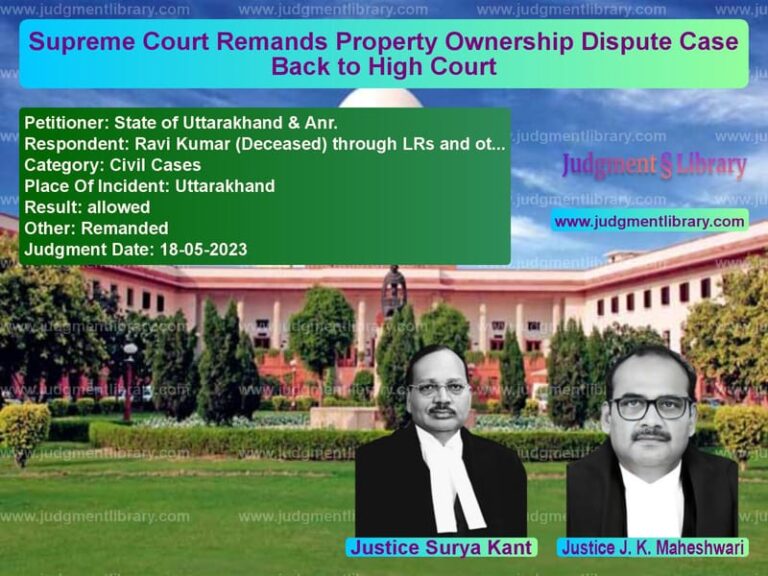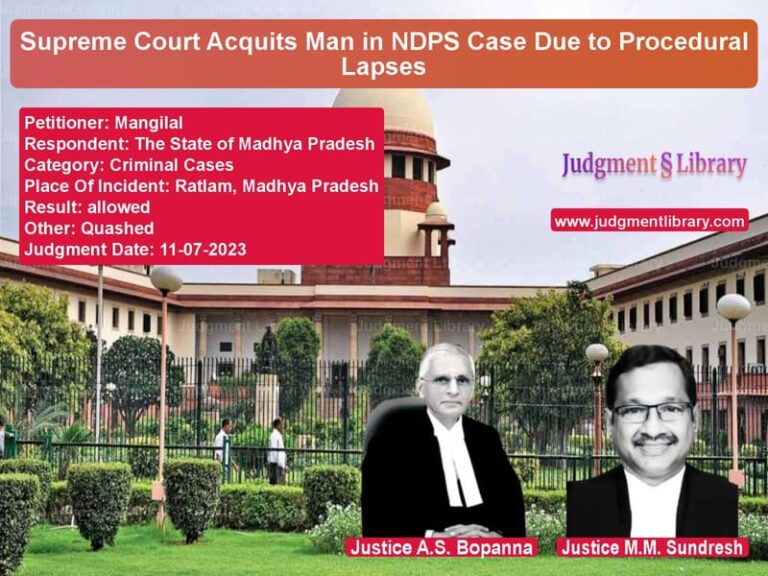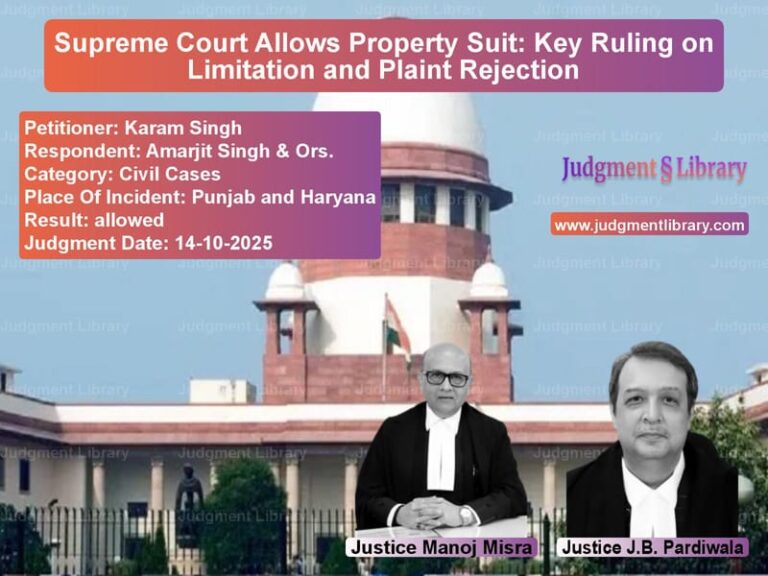Iqram vs. State of Uttar Pradesh: Supreme Court Orders Concurrent Sentences in Electricity Theft Case
The Supreme Court of India, in its judgment dated December 16, 2022, delivered a crucial ruling in the case of Iqram vs. State of Uttar Pradesh. The case revolved around the sentencing of an accused convicted in multiple cases of electricity theft. The appellant, Iqram, had been sentenced separately in nine different cases, leading to an effective prison term of 18 years. The Supreme Court intervened to rectify this gross miscarriage of justice and ruled that all the sentences should run concurrently, significantly reducing the time the appellant would have to serve.
Background of the Case
The appellant, Iqram, was charged with and convicted in nine different criminal cases related to the theft of electricity equipment belonging to the Electricity Department of the State of Uttar Pradesh. The cases were registered under Section 136 of the Electricity Act, with some involving additional charges under Section 411 of the Indian Penal Code (IPC).
After being arrested and undergoing trial, Iqram agreed to a plea bargain. The Additional District and Sessions Judge, Hapur, convicted him in all nine cases on November 5, 2020. Each case resulted in a sentence of two years of simple imprisonment, along with a fine of Rs. 1000. The trial court directed that the sentence under Section 136 of the Electricity Act and Section 411 IPC should run concurrently but did not specify whether all sentences across the nine cases would also run concurrently.
Read also: https://judgmentlibrary.com/dying-declaration-in-dowry-death-case-supreme-court-acquits-husband/
The appellant had already spent three years in jail, but the authorities treated each sentence as consecutive, requiring him to serve an effective sentence of 18 years. Aggrieved by this, Iqram filed a habeas corpus writ petition in the Allahabad High Court, seeking an order that his sentences should run concurrently.
Arguments Presented
Petitioner’s Arguments
The counsel for the petitioner contended that:
- The sentencing approach of the trial court had created a situation where Iqram would be required to serve an excessive and disproportionate prison term.
- The trial court had failed to exercise its discretion under Section 427(1) of the Code of Criminal Procedure (CrPC), which allows courts to direct multiple sentences to run concurrently.
- The petitioner had already undergone three years in jail, which was more than the total period he would have served if his sentences were ordered to run concurrently.
- The trial court’s decision to let the jail authorities decide the nature of sentence execution had led to a severe miscarriage of justice.
Respondent’s Arguments
The State of Uttar Pradesh, represented by its counsel, argued:
- The default rule under Section 427 CrPC is that sentences for different offenses must run consecutively unless the court explicitly orders otherwise.
- The trial court had not issued any directive under Section 427(1) regarding concurrent sentences, so the jail authorities were justified in enforcing the default rule.
- Each case involved separate incidents of electricity theft, and treating the sentences as consecutive was in line with legal principles.
Supreme Court’s Observations
The Supreme Court, led by Chief Justice Dr. Dhananjaya Y Chandrachud, took a strong stance against the injustice faced by the petitioner. The Court made the following critical observations:
- “The facts of the present case provide another instance, a glaring one at that, indicating a justification for this Court to exercise its jurisdiction as a protector of the fundamental right to life and personal liberty inhering in every citizen.”
- “If the Court were not to do so, a serious miscarriage of justice of the nature which has emerged in the present case would be allowed to persist and the voice of a citizen whose liberty has been abrogated would receive no attention.”
- “The intervention by this Court to protect the liberty of citizens is hence founded on sound constitutional principles embodied in Part III of the Constitution.”
- “The appellant was convicted in nine cases, and the trial court sentenced him to two years of simple imprisonment in each case. However, due to the lack of a specific direction under Section 427(1) CrPC, the jail authorities treated these sentences as consecutive, resulting in an 18-year term, which is manifestly excessive and unjust.”
Legal Interpretation of Section 427(1) CrPC
The Court analyzed Section 427 of the CrPC, which states:
“When a person already undergoing a sentence of imprisonment is sentenced on a subsequent conviction to imprisonment or imprisonment for life, such imprisonment or imprisonment for life shall commence at the expiration of the imprisonment to which he has been previously sentenced, unless the court directs that the subsequent sentence shall run concurrently with such previous sentence.”
The Court highlighted that under this section:
- By default, sentences run consecutively unless the court directs otherwise.
- Courts have full discretion to order concurrent sentences in cases where multiple convictions arise from related offenses or a similar set of facts.
- The trial court in this case should have exercised its discretion to prevent an excessive cumulative sentence.
Judgment and Ruling
Based on the above observations, the Supreme Court ruled in favor of the appellant and set aside the High Court’s judgment. The key elements of the ruling were:
- The sentences in all nine cases shall run concurrently, ensuring that the appellant does not serve more than two years in total.
- The jail authorities were directed to immediately act upon the court’s order and release the appellant if he had already served his revised sentence.
- The Court strongly criticized the High Court for failing to recognize the miscarriage of justice and not exercising its constitutional duty under Article 226.
Implications of the Judgment
This judgment sets a significant precedent for cases involving multiple sentences. The key takeaways from this ruling include:
- Protection of personal liberty: The ruling reinforces the judiciary’s role in preventing excessive and unjust imprisonment.
- Judicial discretion in sentencing: Courts must exercise their powers under Section 427(1) CrPC to prevent disproportionate sentencing.
- Correction of trial court errors: Higher courts must remain vigilant in correcting miscarriages of justice arising from procedural lapses.
Conclusion
The Supreme Court’s judgment in Iqram vs. State of Uttar Pradesh highlights the importance of judicial oversight in cases involving multiple convictions. By ordering that the sentences run concurrently, the Court ensured that the principles of fairness and proportionality in sentencing were upheld. This case serves as a crucial example of how judicial intervention can rectify systemic failures and protect the fundamental rights of citizens.
Petitioner Name: Iqram.Respondent Name: State of Uttar Pradesh & Others.Judgment By: Justice Dhananjaya Y Chandrachud, Justice Pamidighantam Sri Narasimha.Place Of Incident: Uttar Pradesh.Judgment Date: 16-12-2022.
Don’t miss out on the full details! Download the complete judgment in PDF format below and gain valuable insights instantly!
Download Judgment: iqram-vs-state-of-uttar-prade-supreme-court-of-india-judgment-dated-16-12-2022.pdf
Directly Download Judgment: Directly download this Judgment
See all petitions in Bail and Anticipatory Bail
See all petitions in Custodial Deaths and Police Misconduct
See all petitions in Judgment by Dhananjaya Y Chandrachud
See all petitions in Judgment by P.S. Narasimha
See all petitions in allowed
See all petitions in Quashed
See all petitions in supreme court of India judgments December 2022
See all petitions in 2022 judgments
See all posts in Criminal Cases Category
See all allowed petitions in Criminal Cases Category
See all Dismissed petitions in Criminal Cases Category
See all partially allowed petitions in Criminal Cases Category







